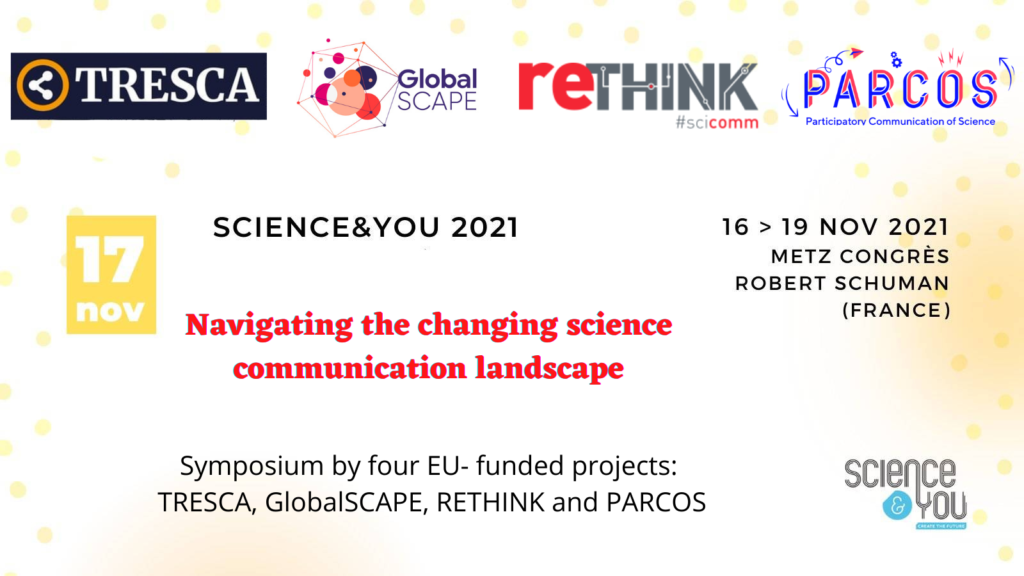Digitalisation and technological developments have contributed to various changes in the science communication landscape. Science communication practitioners are benefitting from new opportunities offered by digital media, but they are also facing new threats, like misinformation and declining trust in science. In addition, an increasing number of new actors are contributing to a diversity of science communication approaches. Traditional actors are giving way to new actors, and a critical public increasingly contributes to knowledge production and sharing. What does this changing science communication landscape entail, and how do different science communication practitioners navigate through novel opportunities and challenges?
In this symposium held on November 17th during the Science & You 2021, representatives of four European projects (RETHINK, ParCos, GlobalSCAPE and TRESCA) reflected on the evolving science communication landscape and the changing roles of various science communication actors. The symposium, moderated by Jason Pridmore, saw the participation of Tessa Roedema, who on behalf of RETHINK talked about the project’s sensemaking research and what these insights mean for the practice of science communication.
Navigating the changing science communication landscape

The RETHINK project aims to provide a new view of the science communication landscape to reveal the barriers that stand in the way of open and reflexive connections between science and society. Two different but interrelated trends lay to the basis of the RETHINK project: blurring boundaries between science and society, and digitalization. The implications of these trends for the fast-changing science communication ecosystem can be seen in the COVID-19 pandemic. The pandemic has been difficult to manage and endure, as it is continuously surrounded by complexity and uncertainty. It needs insights from various scientific disciplines and it involves cultural, political, societal, economic and ethical dimensions. Second, digitalization has fundamentally changed how scientists, other R&I stakeholders and a variety of publics interact and communicate. New actors have entered the public discussion on science. Online, everyone seems to be an expert on the COVID-19 pandemic. It is also a place where widely diverse viewpoints, emotions and values are highlighted. The revolutionized, highly networked and digitalized science communication ecosystem presents science communicators with numerous opportunities, but also reveals lingering challenges. It has also placed a spotlight on individual sensemaking practices and raises difficult questions for citizens: Which information is true, flawed or even false? Which actors can I trust to determine what is true? How should I implement the sometimes uncertain or even contractionary information in my daily life?
The RETHINK project has established ‘Rethinkerspaces’ in 7 countries across Europe – local communities of practice that enabled a shared inquiry and transformative learning process. Together with our Rethinkerspaces we explore questions like: How can science communication practitioners adapt to the reality of citizens’ sensemaking practices, in order to support a constructive dialogue on science? We have mapped current science communication activities across Europe, and gained insights into challenges practitioners encounter and perspective they have on their (changed) role. Recently, we have conducted a study into sensemaking practices with citizens during the first wave of the pandemic. We believe that our insights into sensemaking practices of citizens help in enabling a reflexive practice for science communicators and other part-takers in public discussions on science, and to deal with the abundance of fragmented, incomplete and sometimes misleading information presented online.
